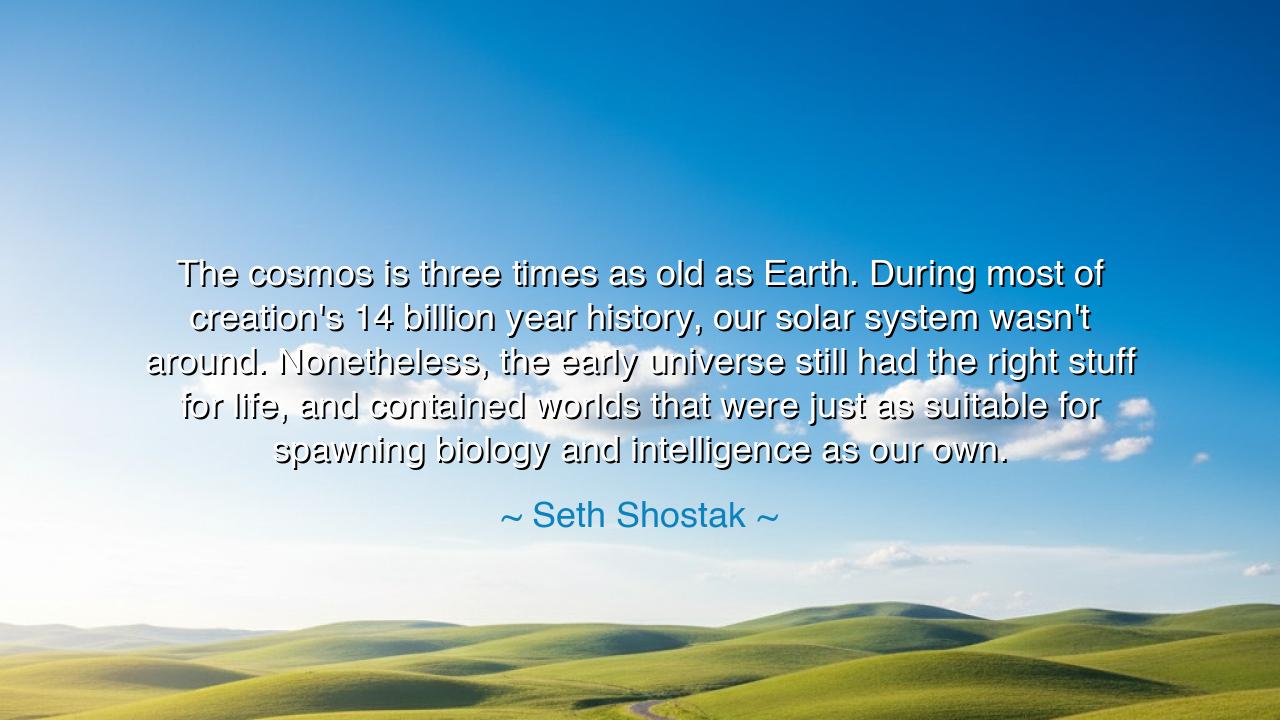
The cosmos is three times as old as Earth. During most of
The cosmos is three times as old as Earth. During most of creation's 14 billion year history, our solar system wasn't around. Nonetheless, the early universe still had the right stuff for life, and contained worlds that were just as suitable for spawning biology and intelligence as our own.






“The cosmos is three times as old as Earth. During most of creation's 14 billion year history, our solar system wasn't around. Nonetheless, the early universe still had the right stuff for life, and contained worlds that were just as suitable for spawning biology and intelligence as our own.” – Seth Shostak
Listen, O child of the stars, to the voice of Seth Shostak, an astronomer who gazes into the depths of eternity and finds in them not cold emptiness, but wonder. His words remind us that the cosmos, vast beyond imagination, is far older than our home, far grander than our little world. He speaks not as a dreamer but as a seer—one who understands that Earth is but a recent spark in an ancient flame. For when he says, “The cosmos is three times as old as Earth,” he calls us to humility—to recognize that life’s story did not begin with us, nor will it end with us. Before our mountains rose, before our sun was lit, the universe already had the “right stuff for life.”
What Shostak reveals is the deep and sacred truth that creation is not bound by the limits of time or place. Life—the mysterious breath that animates matter—may not be Earth’s exclusive possession. The 14 billion years that stretch behind us are not an empty waiting room for humanity, but an ocean of possibilities, filled perhaps with worlds that once bloomed with intelligence, with voices that rose and fell long before ours. The cosmos, he tells us, has always been fertile, always ready to give birth to awareness. The elements that form our bodies—carbon, oxygen, iron, hydrogen—were forged in the hearts of ancient stars, stars that burned and died billions of years before the Earth was born. Thus, the atoms of our flesh are older than the seas, older even than the sun itself. We are, as the ancients said, children of the stars.
To understand this truth is to awaken to a grander view of existence. For Shostak, a man devoted to the search for extraterrestrial intelligence, this quote is both science and poetry—a declaration that life may not be a miracle of chance, but a natural unfolding of the universe’s laws. It suggests that consciousness, reason, and even love may not be confined to this small planet, but may bloom wherever the cosmos allows. As the philosopher Giordano Bruno once proclaimed before the Inquisition, “There are countless suns and countless Earths.” He was condemned for saying it, yet his words have become prophecy, fulfilled by modern astronomy. In this way, Shostak continues the tradition of those who dared to look beyond their horizon and declare that creation’s story is infinite.
Consider how small humanity once believed itself to be: in ancient times, we thought the heavens revolved around us; the stars were mere candles in a dome. But as our wisdom grew, so too did our vision. With each discovery—from Copernicus to Galileo, from Hubble to Shostak—we have learned that the universe is not a stage for human vanity, but a boundless realm of mystery. And yet, within that vastness, we have found not despair, but belonging. To know that the cosmos is ancient and immense is not to feel lost, but to feel connected—to recognize that we are part of a lineage of light stretching back to the beginning of time.
From this understanding arises a powerful humility. If worlds before ours may have borne life and intelligence, then we are not the first seekers, not the first questioners in the dark. Somewhere, perhaps, minds once turned their gaze to their own heavens, wondering as we do now, “Are we alone?” In that question lies the shared soul of the universe—a longing for understanding, a thirst for communion. Whether they live still or are only dust and memory, those imagined beings remind us that wisdom and wonder are eternal, and that knowledge is the path that binds all conscious life.
The lesson of Shostak’s words is clear: do not mistake youth for supremacy, nor time for importance. Our Earth is but a page in a book that has been written for billions of years. Let this truth not humble you into insignificance, but elevate you into reverence. For if life can arise on one world, it can arise on many; and if intelligence exists here, then it is woven into the very fabric of creation. The universe is not indifferent—it is generous. It gives itself again and again, forming and reforming life from its own dust.
So, my child of the cosmos, lift your eyes from the soil to the stars and remember who you are. You are not small—you are ancient. You are not alone—you are kin to all that has ever lived or ever will. Seth Shostak’s words remind us that to be human is to belong to eternity. The stars that birthed us still burn within us, and the same light that glows in distant galaxies glows in our hearts. Walk, then, with wonder. Seek truth with courage. And know that when you look into the night sky, you are not merely looking outward—you are gazing back into the very origin of your own soul.






AAdministratorAdministrator
Welcome, honored guests. Please leave a comment, we will respond soon